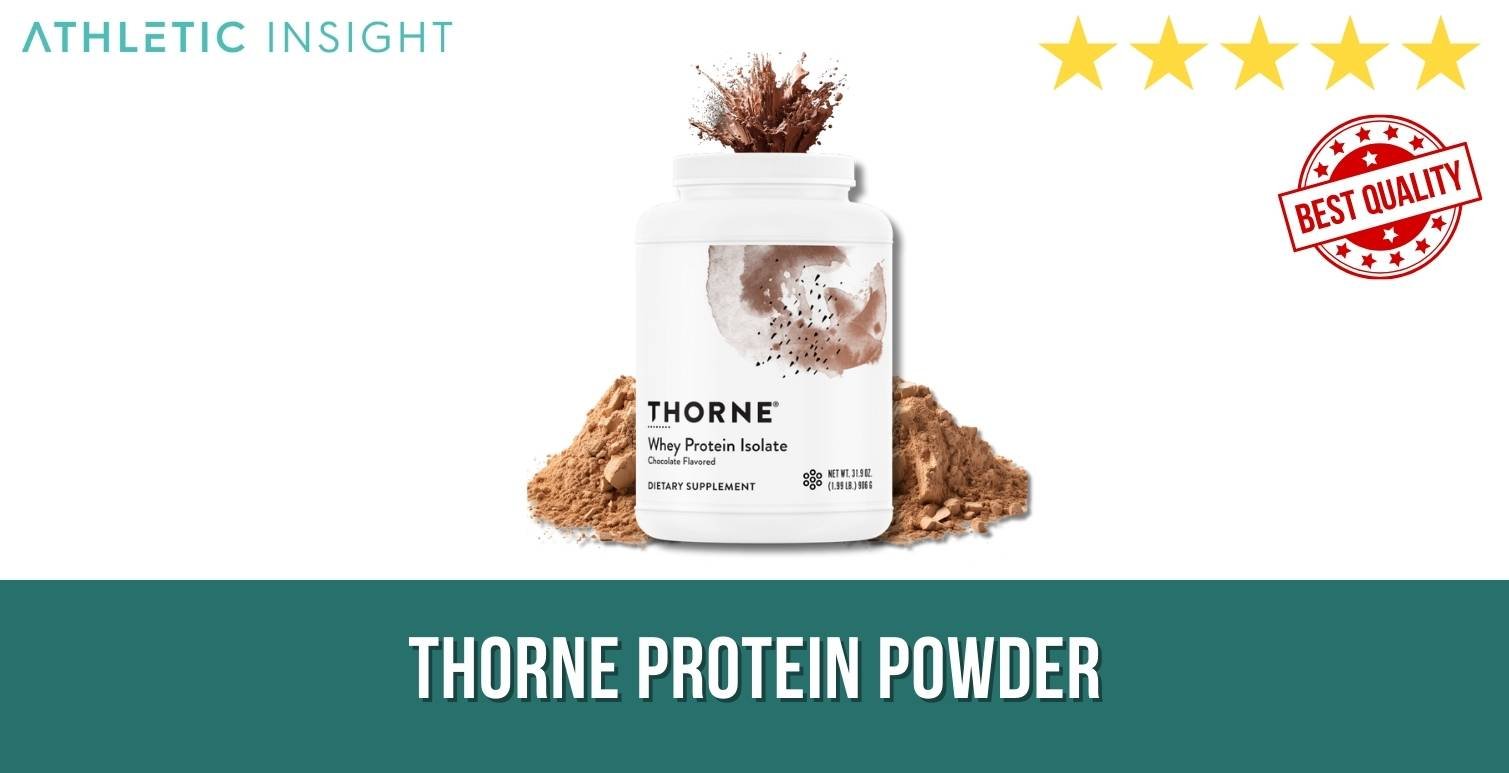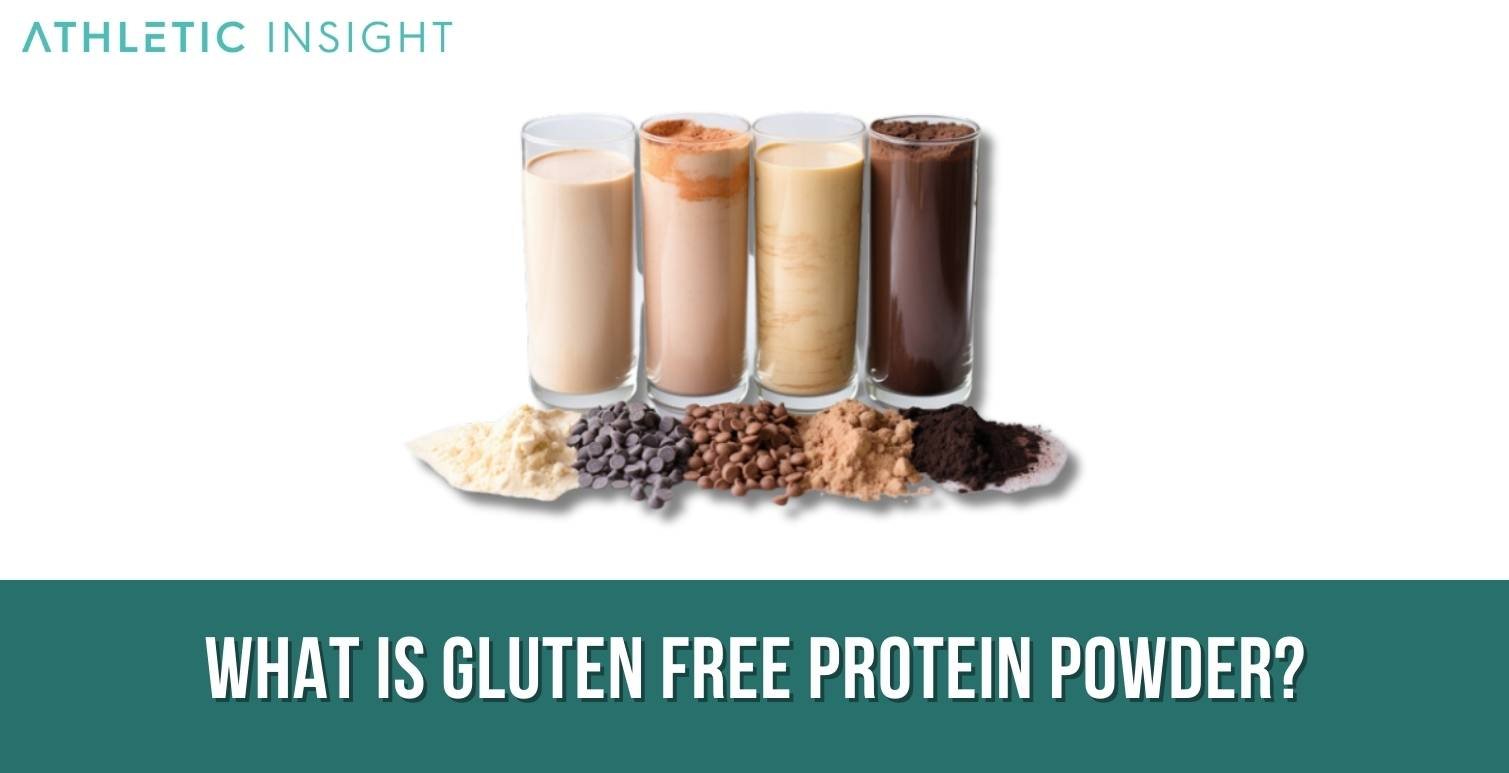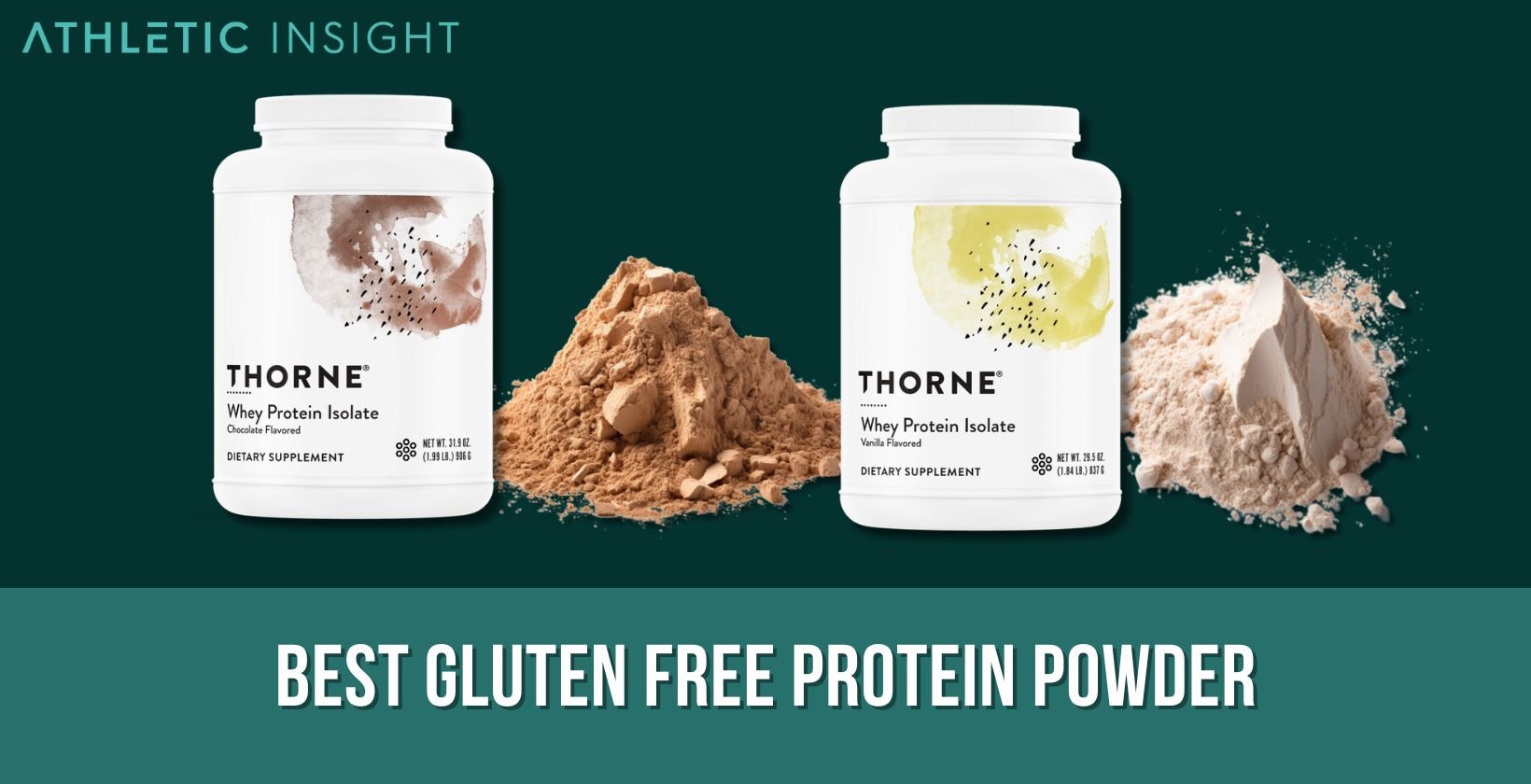As the demand for health-conscious products continues to surge, the market has seen an influx of gluten-free protein powders. These products cater to individuals with gluten intolerance or those who simply prefer a gluten-free diet. This article aims to provide a comprehensive overview of the best gluten-free protein powders available in the market, focusing on their unique features, nutritional value, and consumer reviews.
This top selection list is a meticulously curated compilation of the finest gluten-free protein powders. The list includes Thorne Protein Powder, which has been recognized as the best overall due to its superior nutritional profile and positive consumer feedback. The subsequent entries in the list are equally commendable, each offering a unique blend of quality and value. The list serves as a definitive guide for those seeking to incorporate gluten-free protein powders into their dietary regimen.
- Thorne Protein Powder: Cleanest & Best Overall Pick
- Transparent Labs Whey Protein Powder: Best Tasting Choice
- Optimum Nutrition Gold Standard: Best Budget Option
1. Thorne Protein Powder
Thorne Protein Powder, a high-quality supplement, is a blend of essential nutrients and proteins. The cost of this product is approximately $50 for a 30-serving container (without the Athletic Insight discount), making it a premium-priced product. The ingredients include whey protein isolate, cocoa powder, natural flavors, sunflower lecithin, and stevia leaf extract.

The pros of Thorne Protein Powder include its high protein content, low sugar, and the inclusion of all essential amino acids. However, the cons include its premium price point and the potential for allergic reactions in individuals sensitive to dairy or soy. Reviews for Thorne Protein Powder are generally positive, with users praising its taste and effectiveness.
Key features of Thorne Protein Powder include its high protein content, low sugar, and the inclusion of all essential amino acids. The effects of this protein powder can include increased muscle mass, improved recovery after workouts, and enhanced overall health. The benefits of using Thorne Protein Powder include its potential to support muscle growth and recovery, as well as its contribution to a balanced diet.
Usage of Thorne Protein Powder is straightforward: it can be mixed with water, milk, or a beverage of choice. However, it’s important to note that excessive protein intake can lead to digestive issues, so moderation is key. Lastly, individuals with allergies or dietary restrictions should carefully review the ingredient list before use.
2. Transparent Labs Whey Protein Powder
Transparent Labs Whey Protein Powder, a premium dietary supplement, is priced at approximately $59 per 2.2-pound container. This cost is justified by the high-quality ingredients used in its formulation. The primary ingredient is 100% grass-fed whey protein concentrate, which is supplemented with natural sweeteners and flavors, devoid of artificial additives.
The advantages of this protein powder are manifold. It boasts a high protein content of 24 grams per serving, low sugar, and no artificial sweeteners or coloring. However, the product does have a few drawbacks. The most notable is its relatively high cost compared to other brands. Some users have reported a slightly chalky texture.
Transparent Labs Whey Protein Powder has received predominantly positive reviews, with users praising its taste, mixability, and the noticeable effects on muscle recovery and growth. The product’s features include its transparency in labeling, with every ingredient and its quantity clearly listed. This protein powder is beneficial for those seeking to enhance muscle recovery, increase protein intake, and improve overall body composition.
The recommended usage is one scoop mixed with 6-8 ounces of water or milk, consumed post-workout or as a meal replacement. It’s important to note that individuals with a dairy allergy should avoid this product due to its whey content.
3. Optimum Nutrition Gold Standard
Optimum Nutrition Gold Standard is a premium protein supplement, renowned for its high-quality ingredients and cost-effectiveness. The product is priced at approximately $30 for a 2-pound container, offering a cost-effective solution for those seeking to enhance their protein intake. The primary ingredient is whey protein isolate, a highly purified form of protein that is easily absorbed by the body. Other ingredients include artificial and natural flavors, lecithin, and acesulfame potassium.
The product boasts several pros, including its high protein content, low sugar level, and a wide range of flavors. However, it also has a few cons, such as the inclusion of artificial sweeteners and potential allergens like soy. Reviews for the product are generally positive, with users praising its taste, mixability, and effectiveness in supporting muscle growth and recovery. The product features 24 grams of protein per serving, 5.5 grams of naturally occurring BCAAs, and 4 grams of glutamine and glutamic acid.
The effects of Optimum Nutrition Gold Standard include enhanced muscle recovery post-workout, increased muscle mass, and improved overall athletic performance. The benefits extend beyond physical gains, as the product also supports immune health due to its high protein content. Usage is straightforward, with one scoop mixed with 6-8 ounces of water or milk. It’s important to note that individuals with a sensitivity to dairy or soy should exercise caution when using this product.
4. Vega Gluten-Free Protein Powder
Vega Gluten-Free Protein Powder, priced at approximately $30 per 18.6-ounce tub, is a premium product that offers a blend of high-quality, plant-based proteins. The primary ingredients include pea protein, organic sunflower seed protein, and organic pumpkin seed protein. This unique combination ensures a comprehensive amino acid profile, making it an excellent choice for those seeking a balanced, nutritious supplement.
The advantages of Vega’s protein powder are numerous. It is not only gluten-free but also free from dairy, soy, and artificial flavors, making it suitable for individuals with various dietary restrictions. This product boasts 20 grams of protein per serving, contributing to muscle growth and recovery. However, some consumers may find the taste slightly bitter due to the natural ingredients, and the price point is higher than some other options on the market.
Vega’s protein powder is easy to incorporate into your daily routine, whether mixed into a smoothie or used in baking. It provides a significant energy boost, making it ideal for pre-workout consumption. The benefits extend beyond physical health, as the product is also environmentally friendly, with Vega committed to sustainable sourcing and packaging practices.
5. Orgain Organic Plant Based Protein Powder
Orgain Organic Plant Based Protein Powder is a premium product, priced at approximately $26.99 for a 2.03-pound container. This cost is justified by the high-quality ingredients used in its formulation. The primary components include organic pea protein, organic brown rice protein, and organic chia seed, providing a robust amino acid profile. The product is also free from gluten, dairy, lactose, and soy, making it suitable for individuals with dietary restrictions.
The advantages of this protein powder are numerous. It boasts 21 grams of protein per serving, low sugar content, and a high fiber content, contributing to satiety and aiding in weight management. However, some consumers have reported a slightly gritty texture and a taste that may not appeal to everyone. In terms of features, the product is USDA organic, non-GMO, and vegan, ensuring it aligns with various dietary preferences and requirements.
The effects of Orgain Organic Plant Based Protein Powder can be seen in improved muscle recovery post-workout and enhanced overall health due to its rich nutrient profile. The benefits extend to supporting lean muscle growth, boosting energy, and promoting healthy digestion. Usage is straightforward, with one scoop mixed into water or a beverage of choice. It’s important to note that while this product is generally safe, individuals with specific allergies should review the ingredient list carefully.
6. Klean Athlete Klean Isolate
The Klean Athlete Klean Isolate is a premium dietary supplement, specifically designed to support the nutritional needs of athletes. Priced at approximately $50 for a 444-gram tub, it offers a cost-effective solution for those seeking to enhance their athletic performance. The primary ingredient is bioavailable whey protein isolate, a high-quality protein source that aids in muscle recovery and growth.

Among the pros of Klean Athlete Klean Isolate are its lack of artificial sweeteners, flavors, or colors, and its NSF Certified for Sport® status, ensuring it is free from banned substances. However, the cons include its unflavored nature, which some users may find bland, and the fact that it contains milk, making it unsuitable for those with lactose intolerance.
Reviews for Klean Athlete Klean Isolate are generally positive, with users praising its mixability and effectiveness in supporting muscle recovery. Its key features include 20 grams of protein per serving, low fat and carbohydrate content, and the inclusion of essential amino acids. The effects of regular usage include enhanced muscle recovery, improved athletic performance, and potential weight management benefits.
For optimal benefits, it is recommended to mix one scoop with 10-12 ounces of water or your favorite beverage post-workout. However, it is important to note that individual results may vary, and it is always advisable to consult with a healthcare professional before starting any new supplement regimen. Care should be taken to store the product in a cool, dry place away from direct sunlight.
7. Garden of Life Organic Meal Replacement
The Garden of Life Organic Meal Replacement is a premium product that offers a comprehensive nutritional profile. Priced at approximately $40 for a 2.03-pound container, it provides a cost-effective solution for those seeking a healthy, organic alternative to traditional meals. The ingredients list is replete with organic proteins, vitamins, and minerals, including 20 grams of plant-based protein, 44 superfoods, 21 vitamins & minerals, and 6 grams of fiber per serving.
Among the pros of this product are its USDA Organic, Non-GMO Project Verified, and vegan certifications, which ensure the highest quality and purity. However, some consumers may find the taste less appealing due to the absence of artificial sweeteners. The product has garnered positive reviews for its ability to promote satiety and support weight management. Its features include being gluten-free, dairy-free, and soy-free, making it suitable for individuals with dietary restrictions.
The effects of this meal replacement can vary, but many users report increased energy levels and improved digestion. The benefits extend beyond nutrition, as it also supports immune health and helps manage weight. Usage is straightforward, with one scoop mixed with 8-10 oz of water or non-dairy milk. It’s important to note that this product is not intended to replace all meals, but rather to supplement a balanced diet. Care should be taken to store the product in a cool, dry place to maintain its freshness and efficacy.
8. Dymatize ISO Protein Powder
The Dymatize ISO Protein Powder is a high-quality supplement, renowned for its superior formulation and cost-effectiveness. Retailing at approximately $29.99 for a 1.6-pound container, this protein powder offers a cost-effective solution for those seeking to enhance their fitness regimen. The primary ingredient is hydrolyzed whey protein isolate, a highly bioavailable form of protein that is rapidly absorbed by the body. Other ingredients include natural and artificial flavors, salt, soy lecithin, stevia, and sucralose.
Among the pros of Dymatize ISO Protein Powder are its high protein content, low carbohydrate and fat content, and excellent mixability. However, the product does have a few cons, including its use of artificial sweeteners and potential allergenicity due to the presence of soy. Reviews for the product are generally positive, with users praising its taste, texture, and effectiveness.
The protein powder features 25 grams of protein per serving, making it an excellent choice for muscle recovery and growth. Its effects are most noticeable when used post-workout, but it can also be consumed at any time of the day to meet protein needs.
The benefits of Dymatize ISO Protein Powder extend beyond muscle growth and recovery. It also aids in weight management and supports overall health. Usage is straightforward: simply mix one scoop with 5-6 ounces of water, milk, or your favorite beverage.
9. Naked Vegan Mass Gluten-Free Protein Powder
The Naked Vegan Mass Gluten-Free Protein Powder is a premium dietary supplement, priced at approximately $64.99 for a 5-pound tub. This product is composed of an array of natural ingredients, including yellow peas, organic brown rice, and organic tapioca. The protein powder is devoid of artificial sweeteners, colors, and flavors, ensuring a clean and wholesome nutritional profile.
Among the pros of this protein powder is its high protein content, boasting 30 grams per serving. It also provides a substantial amount of dietary fiber, contributing to digestive health. However, the cons include its relatively high cost and the potential for causing bloating in some individuals. Despite these drawbacks, the product has garnered positive reviews, with users praising its taste and effectiveness in muscle recovery and growth.
The Naked Vegan Mass Gluten-Free Protein Powder is replete with features that cater to health-conscious individuals. It is vegan, gluten-free, and non-GMO, making it suitable for a wide range of dietary preferences. The effects of regular usage include enhanced muscle recovery, increased strength, and improved overall health.
The benefits extend beyond physical fitness, as the product also contributes to overall wellness by providing essential nutrients. It is recommended to mix one scoop of the powder with your choice of beverage post-workout.
10. Purely Inspired Gluten-Free Protein Powder
Purely Inspired Gluten-Free Protein Powder is a premium dietary supplement that offers a cost-effective solution for those seeking a healthful, gluten-free protein source. Priced at approximately $20 for a 1.5-pound container, it provides an affordable alternative to pricier protein powders on the market. The primary ingredients include a blend of organic proteins, fruits, and vegetables, ensuring a nutrient-rich profile.
The product boasts several advantages, such as its organic composition, absence of gluten, and affordability. However, it also has a few drawbacks, including a somewhat chalky texture and a taste that some consumers find less appealing than other brands. Despite these minor issues, the product has garnered positive reviews overall, with users praising its nutritional value and the noticeable effects on their energy levels and muscle recovery.
The features of this protein powder include 20 grams of plant-based protein per serving, no artificial colors, flavors, or sweeteners, and it’s USDA Organic certified. The benefits of using this product are manifold, including improved muscle recovery, enhanced energy levels, and support for a healthy, gluten-free diet.
Usage is straightforward – simply mix one scoop with 8 ounces of water or non-dairy milk. However, it’s important to note that this product is not intended to replace a balanced diet and should be used in conjunction with regular exercise. Care should be taken to store the product in a cool, dry place to maintain its freshness and efficacy.
What is Gluten Free Protein Powder?
Gluten-free protein powder is a dietary supplement that is devoid of the protein composite, gluten, which is typically found in grains such as wheat, barley, and rye. This type of protein powder is specifically formulated to cater to individuals with gluten intolerance or celiac disease, or those who simply prefer to exclude gluten from their diet for personal or health reasons. It is a potent source of protein that aids in muscle recovery and growth, without triggering any adverse gluten-related reactions.

Gluten-free protein powder is often derived from a variety of plant-based sources such as peas, rice, or hemp, or from animal sources like whey or casein, which are naturally gluten-free. The absence of gluten does not compromise the nutritional value of the protein powder. On the contrary, it often enhances the digestibility and absorption rate of the protein, making it an optimal choice for individuals seeking a high-quality, easily digestible source of protein that aligns with their dietary restrictions or preferences.
How to Choose the Best Gluten-Free Protein Powder?
Identifying the optimal gluten-free protein powder necessitates a meticulous evaluation of several key factors. Primarily, the price point is a significant determinant. It is essential to find a balance between cost-effectiveness and quality, ensuring that the product offers value for money. However, the pursuit of affordability should not compromise the nutritional integrity of the protein powder.
The flavor profile is another crucial aspect to consider. A diverse range of flavors caters to varying taste preferences, enhancing the overall consumption experience. Equally important is the ingredient list. A high-quality gluten-free protein powder should contain minimal additives and artificial ingredients, focusing instead on natural, nutrient-dense components. Other factors such as brand reputation, customer reviews, and third-party testing can also provide valuable insights into the product’s quality and reliability.
What are the ingredients in the Gluten-free protein powder?
Gluten-free protein powder is a meticulously crafted blend of several ingredients, each contributing to its nutritional profile. The primary component is typically a plant-based protein source, such as pea protein isolate, brown rice protein, or hemp protein, which are naturally devoid of gluten. These proteins are often combined to ensure a complete amino acid profile, vital for muscle growth and recovery.
Additional ingredients may include natural sweeteners like stevia or monk fruit extract, which provide a palatable taste without the addition of sugars. Some formulations may also incorporate dietary fiber sources, such as inulin or psyllium husk, to support digestive health. Essential micronutrients, such as vitamins and minerals, are often added to enhance the nutritional value.
Lastly, to ensure the product remains gluten-free, manufacturers avoid additives, fillers, or flavorings that may contain gluten, adhering to stringent production processes to prevent cross-contamination.
Does Gluten-free Protein Powder have Vitamin D?
Contrary to common assumptions, gluten-free protein powder does not inherently contain Vitamin D. The composition of protein powders, including those that are gluten-free, primarily revolves around proteins derived from various sources such as whey, soy, or peas. Vitamin D, a fat-soluble nutrient essential for bone health and immune function, is not a standard constituent of these protein sources. Therefore, its presence in a protein powder would necessitate intentional fortification by the manufacturer.
It is crucial to note that some manufacturers may choose to enrich their protein powders with additional vitamins and minerals, including Vitamin D supplements. This is often done to enhance the nutritional profile of the product and cater to consumers seeking a comprehensive dietary supplement. Therefore, while gluten-free protein powder does not naturally contain Vitamin D, certain brands may offer fortified versions. Consumers are advised to meticulously scrutinize product labels to ascertain the presence and quantity of Vitamin D or any other nutrients of interest.
Does Glute-free Protein Powder have Probiotics?
Gluten-free protein powder, a dietary supplement favored by health enthusiasts and athletes alike, is often queried for its probiotic content. Probiotics, the beneficial bacteria that bolster gut health, are not inherently present in gluten-free protein powders. However, certain manufacturers have taken strides to incorporate these microorganisms into their formulations, creating a symbiotic blend of protein and probiotics.
Such protein powders are designed to not only aid in muscle recovery and growth, but also to enhance digestive health. The inclusion of probiotics in these formulations is a testament to the burgeoning understanding of the gut’s pivotal role in overall health. Nevertheless, it is crucial to scrutinize product labels meticulously, as the presence of probiotics supplementations is not a standard feature across all gluten-free protein powders. The potency, strain, and viability of the probiotics used also vary, further underscoring the importance of informed consumerism in the realm of dietary supplements.
What is the average price of Gluten Free Protein Powder?
The average price of gluten-free protein powder typically oscillates between $15 and $50 per pound, contingent upon the brand, ingredients, and the retailer. This price range is a reflection of the meticulous process involved in the production of gluten-free protein powders, which necessitates stringent quality control measures to ensure the absence of gluten. The cost is also influenced by the type of protein used, with plant-based proteins such as pea, hemp, and brown rice often commanding a higher price due to their nutritional profile and the complexity of their extraction process.
Premium brands that incorporate additional health-enhancing ingredients such as probiotics, digestive enzymes, and superfood blends into their products often have a higher price point. The retail environment also plays a significant role in determining the price. For instance, specialty health food stores and online platforms with a focus on health and wellness products may charge more compared to general supermarkets. Therefore, while the average price provides a general guideline, the actual cost of gluten-free protein powder can vary significantly based on these factors.
What are the best sources of protein in a gluten-free protein powder?
Protein powders that are gluten-free predominantly derive their protein content from three primary sources: pea protein, brown rice protein, and hemp protein. Each of these three sources of proteins can be found within the best protein supplements available.
- Pea protein, a plant-based protein source, is renowned for its high digestibility and rich amino acid profile, including the essential branched-chain amino acids (BCAAs).
- Brown rice protein, although slightly inferior to pea protein in terms of amino acid profile, is still a commendable source of gluten-free protein due to its hypoallergenic nature and easy digestibility.
- Hemp protein, a complete protein source, is distinguished by its additional nutritional benefits, including a substantial amount of fiber and omega-3 fatty acids.
Scientific research corroborates the efficacy of these protein sources. A study published in the Journal of the International Society of Sports Nutrition found that pea protein can be just as effective as whey protein at building muscle.
Similarly, a study in Nutrition & Metabolism highlighted the potential of brown rice protein for muscle recovery and growth. Hemp protein, while less studied, has been recognized for its unique nutritional profile that can support overall health in addition to muscle growth. Therefore, these three sources form the cornerstone of high-quality, gluten-free protein powders.
What are the benefits of using a gluten-free protein powder?
Gluten-free protein powder offers a plethora of benefits, particularly for individuals with gluten intolerance or celiac disease. It provides an efficacious solution for maintaining a balanced diet without the risk of triggering adverse reactions.
The consumption of gluten-free protein powder can lead to improved digestion, as it circumvents the bloating and discomfort often associated with gluten ingestion. It can also contribute to enhanced nutrient absorption, as the absence of gluten allows the digestive system to process nutrients more efficiently.
Gluten-free protein powder is not solely beneficial for those with gluten-related disorders. It can also be advantageous for individuals seeking to adopt a healthier lifestyle. The high protein content aids in muscle recovery and growth, making it an ideal supplement for fitness enthusiasts.
Gluten-free protein powder can also assist in weight management by promoting feelings of satiety, thereby reducing the propensity for overeating. The amalgamation of these benefits underscores the utility of gluten-free protein powder as a versatile dietary supplement.
Is Whey Protein Gluten Free?
Yes, most whey protein is gluten free. However, some whey protein can contain gluten depending on where it is manufactured. Always look for a seal of approval and a product that is third-party tested, such as Thorne, which has an NSF Certification.
How to Take Gluten Free Protein Powder?
Gluten-free protein powder, a dietary supplement devoid of the gluten protein found in grains such as wheat, barley, and rye, is an essential component for those adhering to a gluten-free diet or those with celiac disease. The consumption of this protein powder is not a complex process, but it does require adherence to certain guidelines to ensure optimal absorption and effectiveness.

- Correct Dosage: Firstly, it is crucial to measure the correct dosage as recommended on the product packaging. This dosage is typically calculated based on the individual’s body weight and fitness goals.
- Mixed Well: Secondly, the protein powder should be mixed with a liquid of choice, such as water, milk, or a dairy-free alternative. The mixture should be shaken or stirred until the powder is fully dissolved to ensure a smooth consistency.
- Immediate Consumption: Lastly, the protein shake should be consumed immediately after a workout for optimal muscle recovery and growth.
It is also advisable to maintain a balanced diet and regular exercise routine alongside the intake of gluten-free protein powder to achieve the desired health and fitness outcomes.
What is the best time to take a gluten-free protein powder?
The optimal time to consume gluten-free protein powder is contingent upon individual goals and daily routines. However, a prevalent consensus among nutritionists suggests that the morning hours may be the most beneficial. This is primarily due to the body’s metabolic processes being at their peak during the early part of the day, thus facilitating efficient absorption and utilization of the protein.
Scientific evidence corroborates this assertion. A study published in the American Journal of Clinical Nutrition found that protein intake in the morning can enhance muscle growth and repair, which is crucial for individuals engaged in regular physical activity.
Consuming protein in the morning can help regulate appetite and prevent overeating later in the day. It is essential to note that individual physiological responses may vary, and it is always advisable to consult with a healthcare professional or a dietitian to determine the most suitable timing for protein intake.
What is the Recommended Daily Intake of Gluten Free Protein Powder?
The recommended daily intake of gluten-free protein powder varies depending on individual nutritional needs and physical activity levels. However, a general guideline suggests an intake of 46 grams for women and 56 grams for men.
This recommendation is predicated on the Dietary Reference Intake (DRI) established by the Institute of Medicine. It’s crucial to note that this is a general guideline and may need to be adjusted based on factors such as age, weight, and physical activity level.
For those engaging in regular physical activity or strength training, the daily dosage may increase to support muscle recovery and growth. The American Dietetic Association, Dietitians of Canada, and the American College of Sports Medicine recommend 1.2 to 2.0 grams of protein per kilogram of body weight per day for athletes, depending on training. Therefore, the consumption of gluten-free protein powder should be tailored to individual needs, taking into account overall dietary protein intake and specific health goals.



